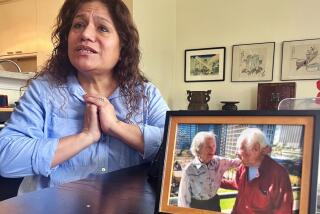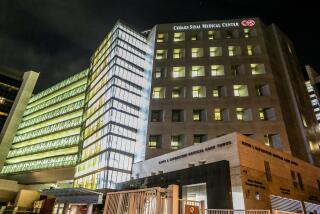Jack Matloff dies at 82; doctor turned Cedars-Sinai into heart transplant leader
- Share via
Dr. Jack Matloff, an innovative heart surgeon and educator who in 1988 established the heart and lung transplant programs at Cedars-Sinai Medical Center, has died there after a long illness
Matloff, who died Thursday, was 82.
Matloff joined Cedars-Sinai in 1969 when it had a modest cardiac surgery program. The founding chairman of its cardiothoracic surgery department, he attracted other top surgeons to the hospital, which last year performed more heart transplants than any other medical center in the country.
“He was a first-class cardiac surgeon,” said Dr. Toby Cosgrove, CEO and president of the Cleveland Clinic in Ohio. “He left a promising career at Harvard, went to Cedars and propelled it into one of the major cardiac centers on the West Coast.”
During his career, Matloff performed more than 4,000 heart operations, including successful bypass surgeries for such Hollywood notables as James Garner, Milton Berle and Rock Hudson.
“Cardiac bypass was his forte. He put us on the map,” said Dr. Shlomo Melmed, a Cedars-Sinai vice president and dean of its medical faculty.
Born in New Haven, Conn., on March 13, 1933, Matloff was the son of Hyman Matloff, a milkman, and his wife, Ruth. He earned his undergraduate degree from Yale University in 1954 and his medical degree from Tufts University in 1958.
Over the next decade, he taught and practiced in the Harvard University medical system, where one of his mentors was Dr. Dwight Harken, considered the father of heart surgery and the intensive care unit.
Matloff was recruited to Cedars-Sinai by Dr. Jeremy Swan, a noted cardiologist who co-invented the Swan-Ganz catheter for measuring blood flow and heart function.
In the late 1960s, open-heart surgery was a new frontier in medicine with high risks of post-operative illness and death.
Matloff’s surgical skill, along with emphasis on improving patients’ lifestyle and using cholesterol-lowering drugs, helped to brighten the outlook.
“He was one of those pioneers who brought down the complication rate of heart surgery dramatically,” Melmed said. “He improved mortality rates and brought modern medical miracles to very high-risk procedures.”
Twenty-seven years after he founded the heart transplant program, it has grown into the largest in the nation, with 120 adult heart transplants completed in 2014.
The author of several hundred scientific papers, Matloff spearheaded a program to track the progress of thousands of the hospital’s cardiac patients. His efforts resulted in the development of a comprehensive database that has been used in studies published in such peer-reviewed journals as Lancet and the New England Journal of Medicine.
He also founded courses at Harvard that educated cardiac surgeons in the politics and economics of healthcare, Cosgrove said.
He advised many medical centers seeking to start or expand cardiac surgery units, including the Shaare Zedek Medical Center in Jerusalem, where he was credited as a driving force behind a multimillion-dollar cardiothoracic surgery department.
Matloff, who retired from Cedars-Sinai in 1997, was known for his sensitive, gentle style — not the typical personality profile for surgeons.
He called many of his bypass patients to congratulate them on every anniversary of the life-saving surgery he performed.
“He called it their rebirth day,” said his son, Stephen.
Besides his son, he is survived by his wife of 48 years, Martha Bernier Matloff; a daughter, Lori Matloff Goler; two brothers, David and Kenneth; and six grandchildren.
More to Read
Start your day right
Sign up for Essential California for the L.A. Times biggest news, features and recommendations in your inbox six days a week.
You may occasionally receive promotional content from the Los Angeles Times.







